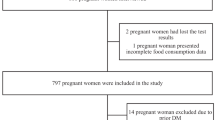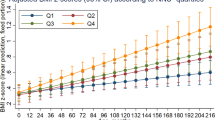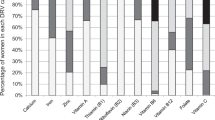Abstract
Objective:
To investigate the association of infant birthweight with maternal diet and supplement intake.
Subjects/Methods:
Prospective cohort study of 504 European and Polynesian urban and rural pregnant volunteers recruited from northern New Zealand clinics. Subjects were visited in months 4 (mth4) and 7 (mth7) of pregnancy when height, weight and skinfolds were measured, questionnaires to determine personal details administered, and diet assessed by a 24-hour recall and 3-day food record.
Results:
After adjusting for confounders nutrients accounted for up to 5.0% of the total variance in birthweight. Ethnicity was not a significant confounder. A quadratic relationship existed between birthweight and % total energy (%TE) from carbohydrate, fat and protein, most significantly with carbohydrate energy (P=0.002). Birthweight was greatest (∼3600 g) when carbohydrate %TE was 48%, fat 35% and protein 17%. Birthweight was reduced with high β-carotene intakes (mth4, P=0.009) and with both high retinol and β-carotene intakes in mth4 and 7 (average). Birthweight was positively associated with increasing pantothenic acid/biotin ratios (P=0.011), magnesium (P=0.000) and vitamin D (P=0.015) intakes in mth4; with biotin (P=0.040) and B12 intakes above the RDI (P=0.006) in mth7; and with pantothenic acid intake in mth4&7 (P=0.002). Dietary supplement usage was associated with increased birthweight, most significantly iron supplementation (P=0.006).
Conclusion:
Birthweight was associated with the %TE from carbohydrate, fat and protein, and with β-carotene, retinol, vitamins D and B12, pantothenic acid, biotin and magnesium intakes and iron supplementation. More research may be required on some dietary recommendations for pregnancy.
This is a preview of subscription content, access via your institution
Access options
Subscribe to this journal
Receive 12 print issues and online access
$259.00 per year
only $21.58 per issue
Buy this article
- Purchase on Springer Link
- Instant access to full article PDF
Prices may be subject to local taxes which are calculated during checkout




Similar content being viewed by others
References
Andreasyan K, Ponsonby AL, Dwyer T, Morley R, Riley M, Dear K et al. (2007). Higher maternal dietary protein intake in late pregnancy is associated with lower infant ponderal index at birth. Eur J Clin Nutr 61, 498–508.
Cohen GR, Curet LB, Levine RJ, Ewell MG, Morris CD, Catalano PM et al. (2001). Ethnicity, nutrition and birth outcomes in nulliparous women. Am J Obstet Gynecol 185, 660–667.
Cuco G, Arija V, Iranzo R, Vila J, Prieto MT, Fernandez-Ballart J (2006). Association of maternal protein intake before conception and throughout pregnancy with birthweight. Acta Obstet Gynecol Scand 85, 413–421.
Doyle W, Crawford MA, Wynn AH, Wynn SW (1989). Maternal magnesium intake and pregnancy outcome. Magnesium Res 2, 205–210.
Doyle W, Crawford MA, Wynn AH, Wynn SW (1990). The association between maternal diet and birth dimensions. J Nutr Med 1, 9–17.
Gibson RS (1990). Principles of Nutritional Assessment. Oxford: Oxford University Press. pp 155–260.
Godfrey K, Robinson S, Barker DJP, Osmond C, Cox V (1996). Maternal nutrition in early and late pregnancy in relation to placental and fetal growth. BMJ 312, 410–414.
Haste FM, Brooke OG, Anderson HR, Bland JM (1991). The effect of nutritional intake on outcome of pregnancy in smokers and non-smokers. Brit J Nutr 65, 347–354.
Hollis BW, Wagner CL (2006). Nutritional vitamin D status during pregnancy: reasons for concern. CMAJ 174, 1287–1290.
Kopp-Hoolihan LE, van Loan MD, Wong WW, King JC (1999). Longitudinal assessment of energy balance in well-nourished, pregnant women. Am J Clin Nutr 69, 697–704.
Lagiou P, Tamimi RM, Mucci LA, Adami H-O, Hsieh C-C, Trichopoulos D (2004). Diet during pregnancy in relation to maternal weight gain and birth size. Eur J Clin Nutr 58, 231–237.
Langley-Evans AJ, Langley-Evans SC (2003). Relationship between maternal nutrient intakes in early and late pregnancy and infants weight and proportions at birth: prospective cohort study. J R Soc Promotion Health 123, 210–216.
Larimore WL, Mathuna DP (2003). Quality assessment programs for dietary supplements. Ann Pharmacother 37, 893–898.
Mannion CA, Gray-Donald K, Koski KG (2006). Association of low intake of milk and vitamin D during pregnancy with decreased birthweight. CMAJ 174, 1–5.
Mathews F, Yudkin P, Neil A (1999). Influence of maternal nutrition on outcome of pregnancy: prospective cohort study. BMJ 319, 339–343.
Mathews F, Youngman L, Neil A (2004). Maternal circulating nutrient concentrations in pregnancy: implications for birth and placental weights in term infants. Am J Clin Nutr 79, 79–103.
Merialdi M, Carroli G, Villar J, Abalos E, Gulmezoglu AM, Kulier R et al. (2003). Nutritional interventions during pregnancy for the prevention or treatment of impaired fetal growth: an overview of randomized controlled trials. J Nutr 133, 1626S–1631S.
Mitchell EA, Robinson E, Clark PM, Becroft DMO, Glavish N, Pattison NS et al. (2004). Maternal nutritional risk factors for small for gestational age babies in a developed country: a case-control study. Arch Dis Childhood Fetal Neonatal Ed 89, F431–F435.
Moore VM, Davies MJ, Willson KJ, Worsley A, Robinson JS (2004). Dietary composition of pregnant women is related to size of the baby at birth. J Nutr 134, 1820–1826.
Muthayya S, Kurpad AV, Duggan CP, Bosch RJ, Dwarkanath P, Mhaskar A et al. (2006). Low maternal vitamin B12 status is associated with intrauterine growth retardation in urban South Indians. Eur J Clin Nutr 60, 791–801.
NHMRC (2006). Nutrient Reference Values for Australia and New Zealand Including Recommended Dietary Intakes. Australia: National Health and Medical Research Council.
Olsen SF, Halldorsson TI, Willett WC, Knudsen VK, Gillman MW, Mikkelson TB et al., NUTRIX Consortium (2007). Milk consumption during pregnancy is associated with increased infant size at birth: prospective cohort study. Am J Clin Nutr 86, 1104–1110.
Omenn GS, Goodman GE, Thornquist MD, Malmes J, Cullen MR, Glass A et al. (1996). Effects of a combination of B-carotene and vitamin A on lung cancer and cardiovascular disease. NEJM 334, 1150–1155.
Palozza P, Serini S, Di Nicuolo F, Piccioni E, Calviello G (2003). Prooxidant effects of β-carotene in cultured cells. Mol Aspects Med 24, 353–362.
Petridou E, Stoikidou M, Diamantopoulou M, Mera E, Dessypris N, Trichopoulos D (1998). Diet during pregnancy in relation to birthweight in healthy singletons. Child Care Health Dev 24, 229–242.
Prentice AM, Goldberg GR (2000). Energy adaptations in human pregnancy: limits and long term consequences. Am J Clin Nutr 71, 1226S–1232S.
Quigley R, Watts C (1997). Food Comes First: Methodologies for the National Nutrition Survey of New Zealand. Public Health Report Number 2, Ministry of Health: Wellington, New Zealand.
Relton CL, Pearce MS, Parker L (2005). The influence of erythrocyte folate and serum vitamin B12 status on birthweight. Brit J Nutr 93, 593–599.
Sloan NL, Lederman SA, Leighton J, Himes JH, Rush D (2001). The effect of prenatal dietary protein intake on birthweight. Nutr Res 21, 129–139.
Takaya J, Yamata F, Higashino H, Kobayashi Y (2004). Relationship of intracellular magnesium of cord blood platelets to birthweight. Metabolism 53, 1544–1547.
Watson P, McDonald B (2003). Nutrition During Pregnancy. Report to the Ministry of Health, Institute of Food Nutrition and Human Health, Albany Campus, Massey University, Auckland, New Zealand.
Acknowledgements
The authors wish to thank the New Zealand Ministry of Health and Health Research Council for their financial support, Mrs Chris King the project manager, the data collectors, data entry and analysis teams, especially Mrs Judi Scheffer, and most of all the subjects who gave willingly of her time.
Author information
Authors and Affiliations
Corresponding author
Additional information
Guarantors: PE Watson and BW McDonald.
Contributors: PEW designed the study, recruited the subjects, collected the data, analyzed the dietary data, and wrote the manuscript. BWM analyzed the data and wrote the manuscript.
Rights and permissions
About this article
Cite this article
Watson, P., McDonald, B. The association of maternal diet and dietary supplement intake in pregnant New Zealand women with infant birthweight. Eur J Clin Nutr 64, 184–193 (2010). https://doi.org/10.1038/ejcn.2009.134
Received:
Revised:
Accepted:
Published:
Issue Date:
DOI: https://doi.org/10.1038/ejcn.2009.134
Keywords
This article is cited by
-
Evidence based recommendations for an optimal prenatal supplement for women in the US: vitamins and related nutrients
Maternal Health, Neonatology and Perinatology (2022)
-
Dietary patterns before and during pregnancy and small for gestational age in Japan: a prospective birth cohort study
Nutrition Journal (2022)
-
Longitudinal measures of maternal vitamin D and neonatal body composition
European Journal of Clinical Nutrition (2019)
-
The health gains and cost savings of dietary salt reduction interventions, with equity and age distributional aspects
BMC Public Health (2016)
-
A Framework for Evaluating the Software Product Quality of Pregnancy Monitoring Mobile Personal Health Records
Journal of Medical Systems (2016)



